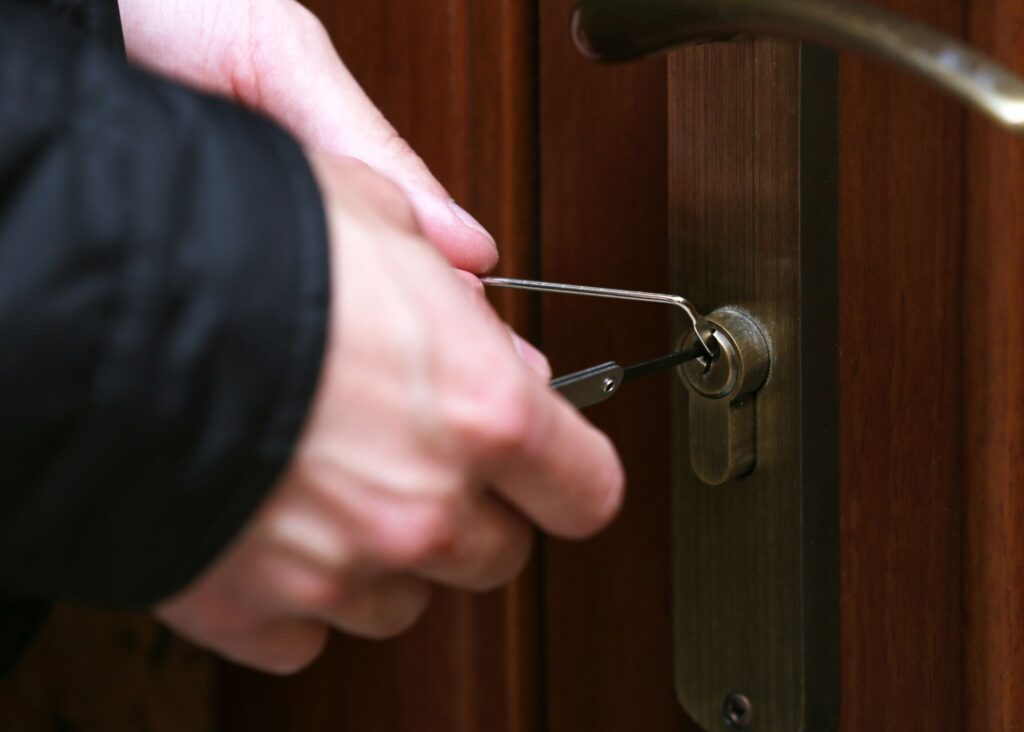The crime of breaking and entering consists of the conduct of entering and maintaining oneself in another person’s home without authorization. This action is carried out in the place of residence of another individual or legal entity. There are two modalities that are differentiated by the use or not of intimidation or violence. A violation of the inviolability of the home and the privacy of the person. The Penal Code establishes the requirements and penalties for this crime.
We can help you. At Law In Cabo we are criminal lawyers. If you need a criminal law firm with extensive experience, contact us and get information without obligation.
Protected legal property
The legal right that is protected is manifested in the National Constitution of the United Mexican States.

Breaking and Entering
Inviolability of domicile
No person may enter or search a domicile without the consent of the owner or by judicial resolution.
Personal and family privacy
Entering or remaining without consent implies a lack of respect and a violation of the privacy that every person deserves against intrusions beyond his or her control.
Requirements to be considered a home invasion crime
The requirements that must be met in order to be considered a home invasion crime.
- The person committing the crime does not have the consent of the person living there, he/she does not have authorization to enter.
- The permanence in any of the sectors inside the dwelling of another person is not consented.
- The person accused of the crime is not a public official, in the latter case it is another type of more serious crime.

Breaking and Entering
What is a dwelling?
A dwelling is any enclosed place that is separated from the outside and in which the inhabitant resides permanently or temporarily. In other words, it includes both habitual and seasonal residences.
It is not necessary that the owner holds a title, but that he proves the development of an activity in the property. Thus, whoever enters a premises open to the public or a legal domicile against the will of the owners is also punished with the weight of the law. In this sense, it is of great interest to relate the concept of dwelling to the illegal occupation of dwellings.
The owners who, instead of going to court to evict the squatters, use mechanisms outside the legal channels to try to recover their home, could be charged with a crime of breaking and entering (even if it is their own home) or even a crime of coercion, depending on the techniques used.
Types of home invasion
According to the modality in which the crime of breaking and entering is committed, it is possible to distinguish the following types:
- Basic: the person committing the crime enters or remains without consent.
- Aggravated: the commission of the crime is accompanied by aggravating circumstances such as intimidating behavior or the use of violence.

Breaking and Entering
A distinction must also be made between active and passive modes.
- Active: the intruder or the person committing the crime enters the home of a third party without the corresponding permission.
- Passive: he remains in the home even when he has been asked to leave.
Breaking and entering by an authority or official.
When the subject who commits the breaking and entering is an authority or official, the act is aggravated.
Examples of breaking and entering
- After a separation or divorce, the individual who no longer resides in the family home enters without notice or consent of the ex-partner.
- A dwelling is intended to be rented, i.e., to be inhabited by a person, and the perpetrator enters without the owner’s permission.
- Justification for breaking and entering
Three reasons can be understood as justifications for breaking and entering, according to the Penal Code:
- Without malice: the subject who acts with the conduct described as breaking and entering does so without knowledge or will to commit the crime.
- To prevent a flagrant crime: the individual enters or remains in another person’s home in order to prevent the commission of another possible crime.
- Exercise of duty or right: it is the case in which there is, for example, a judicial resolution that indicates the entry to another’s dwelling.
Difference between breaking and entering and trespassing
The difference between both figures is very simple and clear. In the case of breaking and entering, it is a requirement that the domicile constitutes the domicile of the owner. In the case of usurpation, the property where the crime is committed is not a place where activities are carried out by the owner. They are, for example, abandoned dwellings.

Breaking and Entering
In summary, the crime of breaking and entering is the action of entering or remaining in another person’s home without the authorization of the inhabitant. A dwelling is understood as an enclosed space delimited from the exterior in which a person carries out activities, whether it is a regular or seasonal dwelling. This conduct can be without or with intimidation and violence, facts that will determine a difference in the criminal punishment.
Are you in Baja California Sur, Mexico? Todos Santos, Los Cabos, La Paz, Loreto, San Jose Del Cabo, Los Cabos, El Pescadero? Are you in Nuevo Leon, Mexico? Apodaca, Cadereyta Jiménez, El Carmen, García, San Pedro Garza García, General Escobedo, Guadalupe, Juárez, Monterrey, Salinas Victoria, San Nicolás de los Garza, Santa Catarina and Santiago…
At Cabo Lawyers we seek to satisfy the different legal needs of our clients, both in their business and personal matters. Contact us at: (+52)8119384461, where we will gladly advise you.
You may be interested in: https://lawincabo.com/what-is-criminal-law
